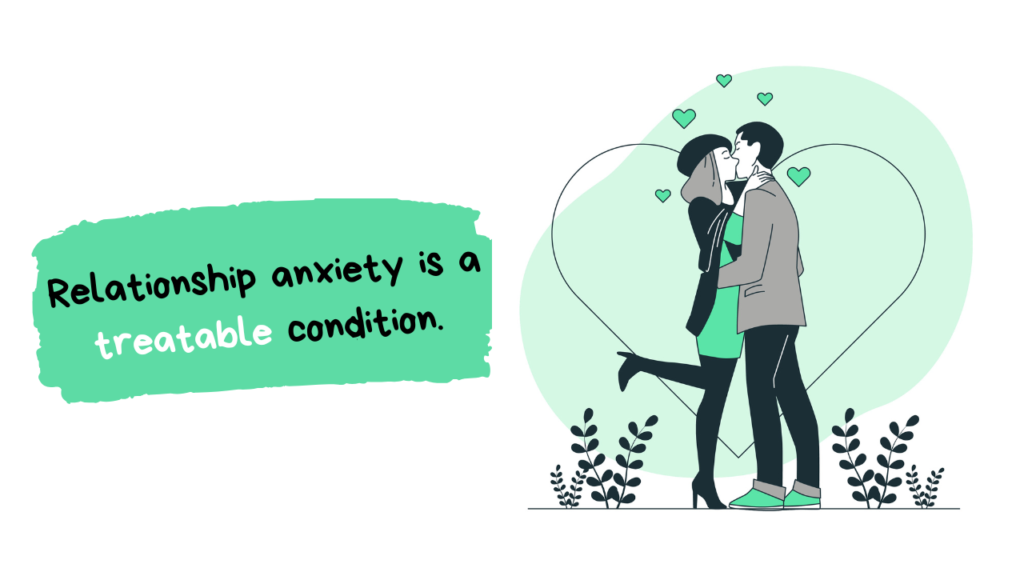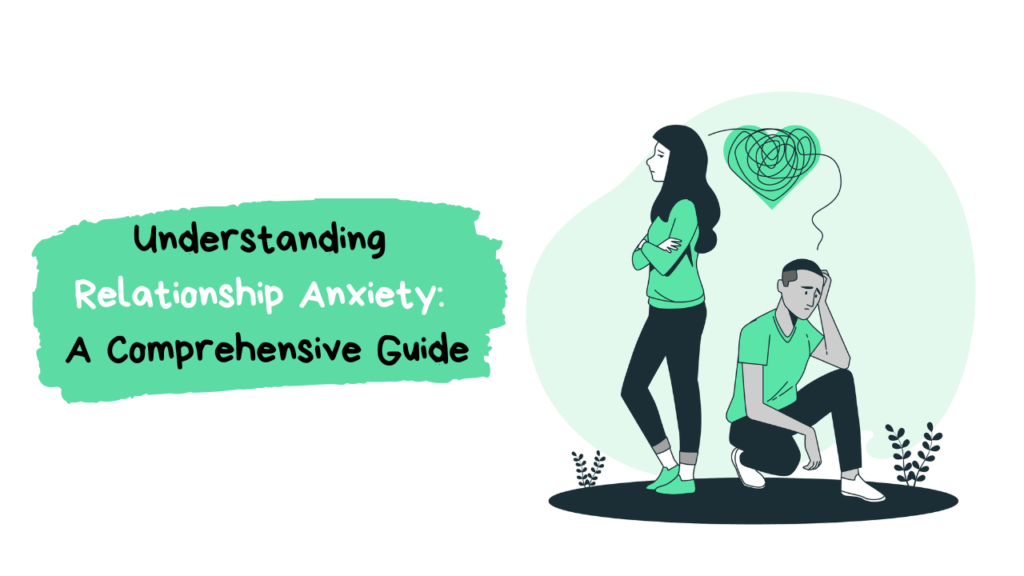Table of Contents
ToggleUnderstanding Relationship Anxiety
understanding Relationship anxiety, often dismissed as mere “insecurity,” is a complex and often debilitating emotional state that can significantly impact our romantic lives. It’s characterized by excessive worry and fear surrounding romantic relationships, leading to a constant state of unease and insecurity.
Delving Deeper: What Fuels Relationship Anxiety?
The roots of relationship anxiety are deeply intertwined with our past experiences, personality traits, and underlying beliefs. Let’s explore some key contributing factors:
- The Echoes of the Past: Our past experiences, both romantic and familial, cast long shadows on our present relationships. Past heartbreaks, betrayals, or even emotionally distant childhoods can leave deep emotional scars, making us wary of trusting and opening up to others. It’s like walking through life with a lingering sense of caution, even when there’s no immediate threat.
- The Attachment Dance: A Legacy of Early Bonds Our earliest bonds with caregivers significantly influence how we form and navigate adult relationships. Attachment theory suggests that our early experiences shape our attachment styles, which influence our expectations and behaviors in romantic relationships. Individuals with anxious-preoccupied attachment styles, for example, might crave intense intimacy but fear abandonment, leading to a constant cycle of clinginess and withdrawal. It’s like a perpetual dance between the desire for connection and the terror of losing it.
- The Mirror of Low Self-Esteem: When we don’t feel good enough about ourselves, it’s easy to project those insecurities onto our relationships. Low self-esteem can manifest as a constant fear of rejection, a belief that we are not worthy of love and affection, and a tendency to constantly seek external validation. It’s like living in a constant state of self-doubt, where every interaction is filtered through a lens of inadequacy.
- The Perfectionist’s Paradox: The pressure to be the “perfect” partner can be incredibly daunting. Perfectionists may strive for flawlessness, fearing any misstep will jeopardize the relationship. This constant pressure creates a hyper-vigilant state, where every word and action is scrutinized for potential flaws. It’s like walking on eggshells, constantly afraid of making a wrong move that could lead to rejection or disappointment.
- The Need for Control: A False Sense of Security For some, anxiety manifests as a need for control in the relationship. This might involve constant reassurance-seeking, excessive monitoring of the partner’s activities, or attempts to dictate their behavior. While these actions may seem like a way to ensure security, they often have the opposite effect, pushing partners away. It’s like trying to hold onto sand – the tighter you grip, the faster it slips through your fingers.
- The Communication Gap: A Barrier to Intimacy Misunderstandings and misinterpretations are inevitable in any relationship. However, when communication is hindered by anxiety, these minor hiccups can escalate quickly. Fear of conflict, difficulty expressing needs, and a tendency to overanalyze every word can create a communication gap that breeds uncertainty and resentment. It’s like trying to navigate a foggy road, where every turn is shrouded in doubt and confusion.
Recognizing the Signs: When Anxiety Takes Hold
Relationship anxiety can manifest in various ways, often subtly creeping into our interactions.
- The Constant Worry Cycle: Experiencing persistent worry about the relationship’s stability, constantly questioning your partner’s feelings, and obsessing over potential threats. It’s like a broken record playing the same anxious tune on repeat.
- The Jealousy Game: Feeling insecure about your partner’s interactions with others, experiencing unwarranted jealousy, and constantly seeking reassurance about their love and commitment. It’s a draining game of “what ifs” and “who’s that?”
- The Reassurance Vortex: Finding yourself constantly seeking reassurance from your partner, needing constant validation and affirmation of their love and commitment. It’s like a bottomless pit, where no amount of reassurance seems to be enough.
- The Control Freak: Feeling the urge to control the relationship, micromanaging your partner’s behavior, or constantly checking in to ensure they’re “where they’re supposed to be.” It’s like trying to build a cage instead of a loving partnership.
- The Communication Breakdown: Struggling to communicate openly and honestly with your partner due to fear of rejection, conflict, or appearing “needy.” It’s like walking on eggshells, afraid to express your true feelings for fear of shattering the fragile peace.
- The Avoidance Trap: Avoiding intimacy, emotional vulnerability, or difficult conversations to protect yourself from potential hurt or rejection. It’s like building walls to keep yourself safe, but those walls inadvertently keep love out as well.
Finding Your Way Back: Coping Strategies
Relationship anxiety can be a challenging but surmountable obstacle. Here are some strategies to help you cope with relationship anxiety:
Self-Reflection: The Journey Inward:
- Unpacking the Past: Take some time to reflect on past relationships and identify any recurring patterns of anxiety. Journaling can be a valuable tool for this introspection.
- Understanding Your Attachment Style: Learn about attachment theory and explore how your attachment style might be influencing your current relationships.
- Identifying Core Beliefs: Examine your core beliefs about yourself and relationships. Are you holding onto any negative or limiting beliefs that are fueling your anxiety?
The Power of Therapy:
- Therapy as a Guide: Therapy, particularly cognitive-behavioral therapy (CBT) or couples therapy, can provide invaluable tools for managing anxiety, improving communication, and building healthier relationship patterns.
- Learning New Skills: Therapists can help you identify and challenge negative thought patterns, develop healthy coping mechanisms, and improve your communication and conflict-resolution skills.
The Mindful Approach: Finding Calm Within
- Mindfulness Meditation: Practice mindfulness meditation to cultivate present-moment awareness and reduce rumination.
- Deep Breathing Exercises: Incorporate deep breathing exercises into your daily routine to calm your nervous system and reduce stress.
- Yoga and Mindfulness-Based Stress Reduction (MBSR): Explore mindfulness-based practices like yoga, which combine physical movement with mindfulness techniques.
Prioritizing Self-Care: Nurturing Yourself
- Rediscovering Yourself: Engage in activities that bring you joy and fulfillment, such as hobbies, spending time in nature, or pursuing personal goals.
- Building Self-Esteem: Focus on building self-esteem through self-compassion, positive self-talk, and celebrating your accomplishments.
- Physical Well-being: Prioritize physical health through regular exercise, a balanced diet, and sufficient sleep.
Open Communication: Building Bridges
- Honest Conversations: Communicate openly and honestly with your partner about your anxieties and concerns.
- Active Listening: Practice active listening skills, truly hearing and validating your partner’s perspective.
- Conflict Resolution Skills: Learn and practice healthy conflict-resolution skills, such as active listening, empathy, and compromise.

Remember: Relationship anxiety is a treatable condition. By understanding the underlying causes, practicing self-compassion, and seeking professional help when needed, you can navigate these challenges and build stronger, more fulfilling connections with your loved ones.
Disclaimer: The information provided in this article is for general knowledge and informational purposes only and should not be considered medical advice. Always consult with a qualified healthcare professional for any health concerns or before making any decisions related to your health.

